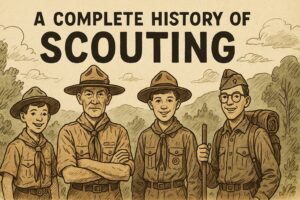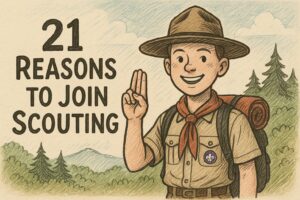The Boy Scouts of America (BSA) is one of the largest and most recognized youth organizations in the United States. Founded in 1910, the Boy Scouts has a rich history of instilling leadership, character, and outdoor skills in young men across the country.
In this post I’ll go over the complete history of Scouting both in the US and around the world to give you a better idea of how the BSA was formed and what you stand to benefit from the BSA.
Founding
Lord Robert Baden-Powell, also known as BP, is widely credited with founding the Scouting movement. BP was a British Army officer who gained fame for his defense of the town of Mafeking during the Second Boer War. He was inspired by the way young boys and men, including his own regiment’s scouts, were able to contribute to the war effort. He realized that the skills and values learned through scouting could be useful in peacetime as well.
In 1907, BP held a camp on Brownsea Island in southern England to test his ideas about scouting. He invited 20 boys from different backgrounds to attend the camp, which lasted for ten days. BP wanted to see if he could teach the boys outdoor skills, self-reliance, and leadership, and if they could form a cohesive group. The camp was a success, and BP wrote a book called “Scouting for Boys” based on his experiences. The book became a bestseller and sparked a worldwide movement.
Arrival In the USA
Scouting first came to the United States in 1909, just two years after Lord Baden-Powell founded the movement in England. A Chicago publisher named William Boyce was lost in the fog in London when a young Boy Scout helped him find his way. Impressed by the boy’s resourcefulness and helpfulness, Boyce asked the boy about the organization he belonged to. The boy was a member of the Scout Association, and he introduced Boyce to Baden-Powell. Boyce was so impressed by the Scouting movement that he brought it back to the United States and established the Boy Scouts of America (BSA) in 1910.
The BSA quickly grew in popularity, and by 1912, it had more than 100,000 members. The BSA was modeled after the British Scout Association, but it was adapted to fit the unique needs of American youth. The organization incorporated American values, such as democracy and individualism, and focused on outdoor activities that reflected the American frontier spirit. The BSA also emphasized the importance of service to others, and it encouraged Scouts to take an active role in their communities.
Growth
The Boy Scouts of America (BSA) experienced tremendous growth in its early years, with membership skyrocketing from just a few thousand in 1910 to over a million by the 1930s. This growth was due in part to the popularity of outdoor activities and the desire to instill values such as self-reliance, leadership, and community service in young people. The BSA also benefited from the support of influential people, such as President Theodore Roosevelt, who praised the organization and its values. The BSA expanded its programs to include Cub Scouting for younger boys and Venturing for older youth, which allowed it to reach a broader audience.
Scandals
The Boy Scouts of America (BSA) has faced a number of scandals over the years. One of the most significant was the sexual abuse scandal that came to light in the 2010s. In 2012, the Los Angeles Times published a series of articles exposing the extent of the problem within the BSA. The articles revealed that the organization had kept secret files on thousands of alleged sexual abuse cases, dating back decades. The files showed that the BSA had frequently failed to report allegations to the police and had allowed suspected abusers to continue working with children. The scandal led to a number of lawsuits against the BSA, and the organization eventually filed for bankruptcy in 2020 to deal with the financial fallout from the litigation.
Another scandal the BSA faced was related to discrimination against LGBTQ+ individuals. For many years, the BSA had a policy banning openly gay members and leaders. This policy was controversial and led to protests and boycotts of the organization. The BSA faced legal challenges over the policy, with the Supreme Court ultimately ruling in 2000 that the organization had the right to exclude gay members. However, the policy remained a source of controversy and criticism, and the BSA eventually changed its policy in 2013 to allow openly gay youth members and in 2015 to allow openly gay adult leaders. Despite the policy change, the BSA continues to face criticism from some LGBTQ+ activists who believe the organization has not gone far enough in addressing discrimination.
Scouting Around the World
Scouting has become a global movement, with millions of members in more than 170 countries. The values and principles of scouting remain largely consistent across different countries, but the specific activities and programs can vary based on local needs and cultural traditions. Scouting continues to be a popular activity for young people around the world, providing opportunities for leadership development, outdoor adventures, and community service.
Scouting has also been recognized for its contributions to international peace and understanding. The World Organization of the Scout Movement (WOSM) promotes international cooperation and understanding through scouting programs and events, such as the World Scout Jamboree. Scouts from different countries have the opportunity to meet and learn from each other, fostering cross-cultural understanding and friendship. In addition, scouting has been praised for its focus on environmental stewardship and sustainability, with many scouting organizations promoting eco-friendly practices and programs that encourage young people to connect with nature and protect the planet.
The Future of Scouting
The future of scouting is likely to be shaped by changing social and technological trends. Scouting organizations are likely to continue to adapt to the needs and interests of young people, developing programs that reflect changing societal values and priorities. This could include more focus on environmental stewardship, mental health, and digital skills. As technology continues to evolve, scouting organizations may incorporate new tools and platforms into their programs to engage young people and enhance learning opportunities. At the same time, scouting will likely continue to prioritize its core values of character development, leadership, and community service, providing young people with opportunities to develop skills and values that will serve them throughout their lives.
Conclusion
I hope you know have a better understanding of Scouting and what Scouting can mean to you. There is plenty of other history that I wasn’t able to cover in this post so I encourage you to do your own research. That’s all for now though. As always, wishing you the best on your Path To Eagle.


